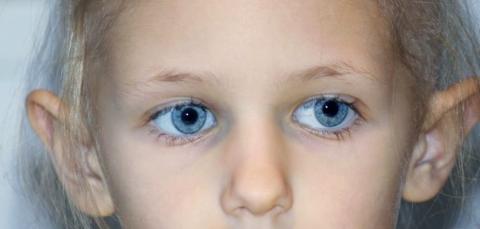“Scars help us remember what God has done for us,” my mom once said, referring to the long scar down the back of my head and neck. I was nine years old in 1983; when I was diagnosed and treated for a cerebellar astrocytoma, grade II—a tumor about the size of a golf ball near my brain stem.
As a 30-year survivor, the memories have faded along with the scars. At 39, the memories I have are of a nine-year-old girl with concerns and fears much different than an adult facing cancer. I know now that my parents sheltered me from the dangers I faced, and they took on those burdens themselves. I don’t remember ever being afraid of dying or even losing my eyesight. I only wanted to be normal again.
In September 1983, my twin sister, Sarah, and I had started the 4th grade. I loved school and was in a new “gifted and talented” program. I had also started taking tumbling and dance classes again after taking a year off. I remember having bad headaches—the kind where I’d lay on the couch and just hold my head—as early as the Easter before. My parents assumed my bad headaches were migraines but took me to a family doctor that fall.
The family doctor sent me for a CAT scan, and I remember going to a neighboring county with a CAT scan in a semi trailer. I don’t remember being scared of the CAT scan and definitely didn’t have any idea what it could reveal—just not wanting to miss a day of school and not wanting to be sick. After getting my CAT scan results, the doctor referred me to a neurologist, and we were soon packing bags for the hospital.
The only people I knew who had been in the hospital were old, and it wasn’t somewhere I planned to be for long. I ended up being there for two weeks. I had one surgery to place a shunt in my head for hydrocephalus (“water on the brain”) caused by the tumor and a second, much longer surgery to remove the tumor.
Before the first surgery, I remember my neurologist coming in and drawing on the bed sheets as he explained how the ventricles in my brain were much bigger than they should be. That’s the only thing I remember ever being explained, and definitely no mention of the tumor.
Though I remember having a tour of the oncology department before I was released from the hospital, I had no clue what radiation treatments were. I saw the machine during the “tour” and envisioned some kind of gas coming down from it as I laid there on the bed underneath it having to breathe in the fumes. I dreaded starting treatments—not just because I might lose my hair, but because I imagined something awful. I remember lying on my stomach while the ladies drew on the back of my bare head, marking the spots that would be radiated. I was relieved when the treatments started, and all I had to do was lie on a table and stay still.
After a few weeks of radiation treatments, I started attending school part-time, with treatments in the morning and school in the afternoon. I was glad to be back in school but worried that the other kids would think I was weird. It wasn’t long before the short hair in the back of my head that had started growing in again after surgery began to start falling out in clumps. I remember lying in the bathtub and crying as I pulled out my hair and can still see the bits of hair that got stuck in the hood of the coat I wore. My parents bought a wig—one for an adult—and our hairdresser cut it down to size. I hated the stigma of wearing a wig—something only old ladies wore—and would have rather gone to school with a bald head than wear it. But, I always wore it to school. Even when my hair miraculously started growing in months after the radiation treatments, I obsessed about my hair and looking like a boy.
As an adult, all of this seems really shallow, but in my defense, I don’t think my illness was ever explained to me. Probably because I was too young. And, when I was a little older, I didn’t feel comfortable asking. Though I’m technically a cancer survivor, I don’t see myself as a cancer survivor. Maybe it’s because I didn’t live through the fears that adults have when faced with a diagnosis. Mine were more about being normal and facing the unknown—not facing a potentially deadly disease. That might seem shallow, but to a pre-pubescent nine-year-old, fitting in was a really big deal. And, I didn’t want to be seen as different.
Bertolt Brecht wrote, “The human race tends to remember the abuses to which it has been subjected rather than the endearments. What's left of kisses? Wounds, however, leave scars.” Sometimes it is easier to remember the wounds rather than the blessings, but as an adult, I’ve had friends and family members die of cancer, and I have a better idea of what could have been. I’ve met a few other long-term brain tumor survivors online, and they have all had recurrences or long-lasting side effects from their treatment as children. Other than being a little short and having some minor peripheral vision loss, I’m totally normal. Today, the scars remind me to be thankful for life and to God for a miraculous recovery.
NOTE: If you or someone you know is an adult survivor of a childhood brain tumor, check out the Facebook group: Longest Brain Tumor Survivor. There are several of us out there!
Jennifer Reginald is a freelance writer and marketer from Maryland. Her website can be found at www.jenreginald.com.




